Premium
The Conclave and future of the church: What’s at stake in choice of next Pope
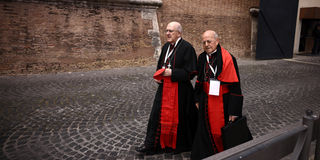
Cardinals walk, ahead of the conclave to elect the next pope, as seen from Rome, Italy, May 6, 2025.
What you need to know:
- The papal conclave is a global moment of spiritual and institutional consequence.
- This conclave is not simply about continuity or change, but about the soul of the Church in a rapidly changing world
- The choice of a pope is never merely about personality or charisma; it is about vision and ecclesiology.
Today (Wednesday, May 7) in the afternoon, the doors of the Sistine Chapel close and the conclave gets underway, while the world waits with expectation for the white smoke, hopefully sooner rather than later.
The papal conclave that begins on Wednesday is no ordinary ecclesiastical event; it is a global moment of spiritual and institutional consequence. For the world’s 1.4 billion Catholics, and indeed, for many beyond the Church, the outcome of this secretive gathering will shape the tone, direction, and attitude of the Catholic Church for years to come.
Perhaps the most immediate question on people’s minds is: What kind of pope will we get? Will he be a continuation of the legacy of Pope Francis, or a break from it? Will he be Italian, signalling a return to old geographical strongholds, or could the papacy venture further into the Global South, possibly even to Africa?
Though speculation is rife, history teaches us that the choice of pope often defies prediction. The deliberations of the College of Cardinals are conducted in utmost secrecy, far from the ears of analysts and bookmakers. But while the names remain uncertain, the stakes could not be clearer.
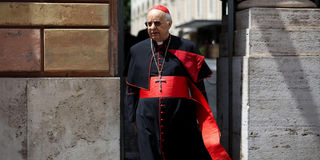
Cardinal Lorenzo Baldisseri walks, ahead of the conclave to elect the next pope, as seen from Rome, Italy, May 6, 2025.
This moment marks a decisive crossroads for the Church. The choice of a pope is never merely about personality or charisma; it is about vision and ecclesiology. The conclave must wrestle not only with who the next pope will be, but with what kind of Church he will be asked to shepherd. In this sense, what is at stake is not just papal succession, but the very identity of the Church in the modern world.
Pope Francis, now laid to rest at the Basilica of St. Mary Major in Rome, leaves behind a remarkable and deeply complex legacy. As the third non-Italian pope in modern history, and the first from the Americas, Francis signalled change from the moment he stepped onto the balcony of St. Peter’s Basilica in 2013. His very first gesture, asking the people to bless him before he blessed them, embodied the spirit that would come to define his papacy: humility, simplicity, and a closeness to the people.
Papal customs
Francis broke with many papal customs that had accumulated over centuries. He chose not to live in the Apostolic Palace, opting instead for the modest Casa Santa Marta to remain more accessible and grounded. He rejected the traditional red shoes, symbolising the blood of martyrs, for plain black ones, a subtle but telling shift in papal symbolism. His vestments were simple, his cross was silver instead of gold, and his vehicle of choice was a modest Ford Focus or, on occasion, an old Renault 4.
These were not cosmetic changes. They were signs of a different kind of papacy—one less concerned with clerical privilege and more attuned to the pastoral needs of a wounded world. Francis washed the feet of prisoners and Muslims on Holy Thursday, emphasised mercy over judgment, and consistently referred to himself as the “Bishop of Rome” rather than invoking exalted titles like “Vicar of Christ.” He sought to humanise the papacy and bring it closer to the people.
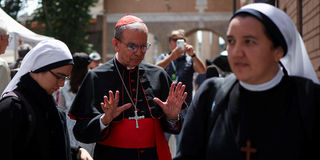
Cardinal Gregorio Rosa Chavez gestures, ahead of the conclave to elect the next pope, as seen from Rome, Italy, May 6, 2025.
More substantively, Francis pushed for reform within the Vatican bureaucracy, took on entrenched interests in the Roman Curia, and demanded financial transparency. He made global headlines with his concern for climate change, migration, economic inequality, and the dignity of the marginalised groups. His landmark encyclical Laudato Si’ called for an ecological conversion, and his outreach to Muslims, notably through the Document on Human Fraternity signed with the Grand Imam of Al-Azhar, marked a new chapter in interreligious dialogue.
Doctrinal clarity
But these reforms were not without controversy. Francis’ critics accused him of ambiguity and of destabilising doctrine in favour of dialogue. His openness to discussing contentious issues such as divorced and remarried Catholics receiving communion, more inclusion of women in the church’s ranks, or pastoral care for other minority groups, was seen by some as diluting the Church’s moral and doctrinal clarity. His decision to limit the use of the traditional Latin Mass also angered some conservatives who viewed it as a cherished expression of Catholic identity.
Thus, as the cardinals gather under Michelangelo’s frescoed ceiling, they face not only the question of Francis’ legacy, but also of the fault lines within the Church that his papacy exposed. Will the next pope continue Francis’ path of reform and openness? Or will he chart a more traditional course, restoring what some perceive as lost clarity and order?
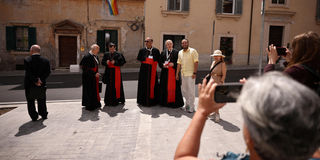
People take pictures of cardinals, ahead of the conclave to elect the next pope, as seen from Rome, Italy, May 6, 2025.
There are three broad possibilities, each with profound implications. First, the cardinals could choose a pope who will continue and deepen Francis’ agenda, building on his concern for the poor, for migrants, for the environment, and for pastoral accompaniment over legalism. This would signal a Church more at home in the margins than in the halls of power.
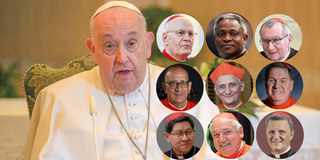
The likely successors of Pope Francis: Cardinal Peter Erdo (Top left), Cardinal Peter Kodwo Appiah, Cardinal Pietro Parolin, (Middle row from left), Cardinal Juan Jose Omella, Archbishop of Bologna Matteo Maria Zuppi, Cardinal Joseph Tobin. (Bottom row) Cardinal Luis Antonio Gokim Tagle, Jean-Marc Aveline, archbishop of Marseille and Cardinal Mario Grech.
Second, they could elect a pope who pivots toward conservatism—seeking to restore doctrinal precision, liturgical tradition, and a clearer boundary between the Church and modern cultural trends. This path might calm some internal dissent, but it risks reigniting divisions and alienating those drawn to Francis’ more inclusive spirit.
A third, and perhaps an ideal but an unlikely possibility, is the election of a pope who can balance both visions: someone who maintains the pastoral openness of Francis while reaffirming the theological coherence and liturgical beauty that many Catholics still long for. Such a pope will not merely preserve a legacy or correct a course, but also heal any division that may have been caused, holding together the church’s many charisms under the unity of truth and love.
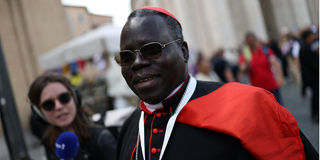
Cardinal Stephen Ameyu Martin Mulla speaks to the media, ahead of the conclave to elect the next pope, as seen from Rome, Italy, May 6, 2025.
Already, voices across the world are expressing hopes and anxieties. Some pray for a stabilising figure who will bring unity and calm after what they see as years of disruption. Others hope for a bold leader who will not let the Church retreat from the difficult conversations that Francis began— about the role of women, the dignity of the poor, and the future of the planet, among others.
What we must keep in mind, however, is that this conclave is not simply about continuity or change, but about the soul of the Church in a rapidly changing world. Amid all this speculation, it is worth remembering that popes come and go. What endures is the Church herself, the body of Christ, moving through history.
While the office of the pope is supremely important, it is the Church’s vitality that’s most at stake. What’s at stake in this conclave is not merely the personality of the next pontiff, but the ecclesiology that undergirds the choice. Will the Church be seen as a fortress to be defended, or a field hospital to be deployed in the wounds of the world? Will it be a Church of dialogue or one of definitions? A Church moving forward or one retreating into itself?

Nuns walk near St. Peter's Square, ahead of the conclave to elect the next pope, as seen from Rome, Italy, May 6, 2025.
These are the deeper questions that the elector cardinals must wrestle with, and that we, the faithful, must accompany in prayer and reflection. Whatever the outcome, we must hope not merely for a good pope, but for a holy one. Not merely a skilled administrator, but a true shepherd. One who will lead not by power, but by witness. Not by ideology, but by faith.
The conclave will pass. The smoke will rise. A name will be announced. But the mission remains the same: to proclaim the Gospel in season and out of season, to walk with the poor, to seek truth, and to bear witness to the love of God in our time.
The writer is Director – Institute of Social Communication, Tangaza University


